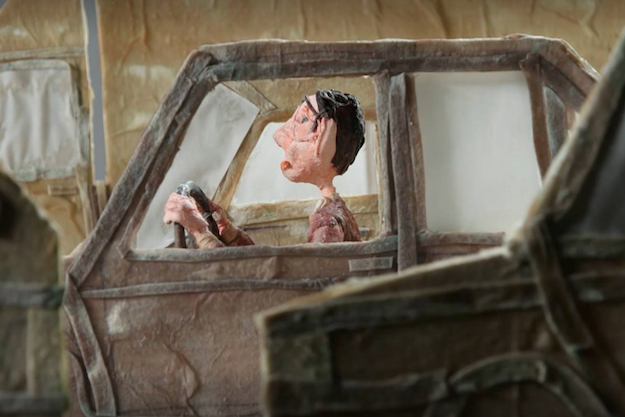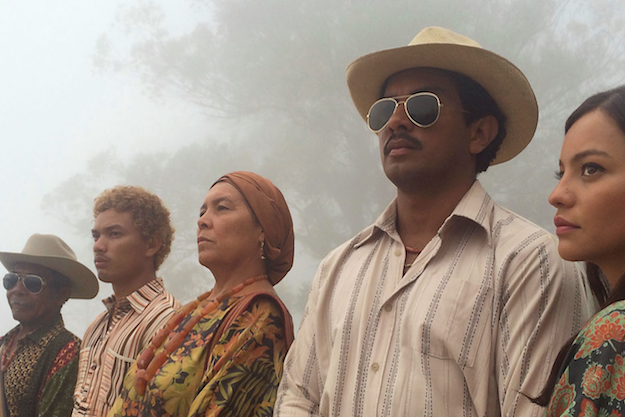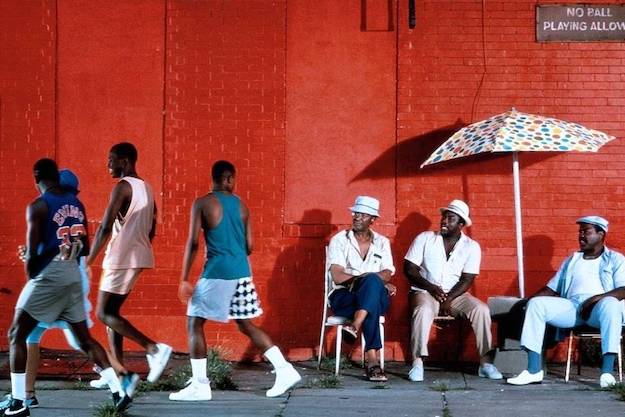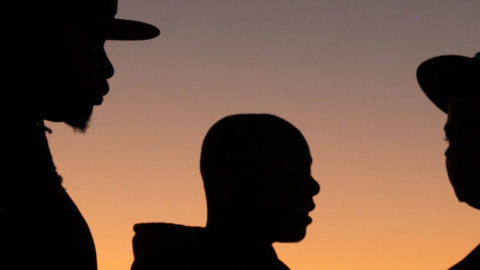Festivals: Chicago 2018

Joy
The penultimate night of this year’s Chicago International Film Festival included a career tribute to costume designer Ruth Carter, the genius who dressed Denzel Washington as Malcolm X, Angela Bassett as Tina Turner, David Oyelowo as Dr. King, and all the royals and subjects of Wakanda. She gave the world Buggin’ Out’s eye-popping spectacles and desecrated Jordans in Do the Right Thing (1989) and those purple-and-teal tearaway tuxes in The Five Heartbeats(1991), and she talked Oprah Winfrey and Forest Whitaker into His-’n’-Hers, raised-checkerboard, black-and-white jumpsuits in Lee Daniels’ The Butler (2013). This vanguard artist affords herself well-earned credit for what she called “storytelling with color,” especially having started when “so many people were doing everything in gray and beige, and seemed so proud of it.” So did this innovator always know she was fated for a living-legend career in devising cinematic ensembles?
“Oh, no,” she told her onstage interviewer, the actress and playwright Regina Taylor. “I thought I was going to be a dermatologist. You know, I was always washing my face and stuff.”
Carter, representing her craft in a cranberry blazer and slacks, black top, and jade stiletto heels—the red/black/green coordination no more accidental here than in that South Korean casino in Black Panther—brought down the house a few times during her hour in the spotlight. (Another choice quote, about a 12-time collaborator: “Spike Lee is an interesting cat. Emotions can run kind of high on his sets. He has some meltdowns. But, my mother was a psychologist, so I can handle that.”) A charismatic raconteur who illuminated telling nuances in some of her most famous visions, Carter was disarming in both her fine aesthetic judgment and her plainspoken lack of pretense, and in that way embodied the very event that honored her.
Every year, the Chicago International Film Festival (CIFF) balances its august history as North America’s oldest competitive fest against enough Midwestern modesty to unfold entirely within the same AMC multiplex. World-class art swans through that Raisinet-friendly environment, where this year’s highly discerning judges (including Taylor) connected strongly with some of the most beloved bridesmaids of the big European festivals. Alice Rohrwacher’s Happy as Lazzaro and Jia Zhangke’s Ash Is Purest White, which dazzled critics at Cannes but secured only half a prize between them, left the Windy City with a Best Film prize for the former and, for the latter, a diptych of Director and Actress citations.
Even more pleasing than these just deserts for consummate work was the serendipity of three autonomous juries bestowing their top awards on movies directed by women—all the more fortuitous since Chicago’s festival stands as one of too few on the world stage with a female artistic director. In addition to Rohrwacher’s Gold Hugo, Vietnamese-born NYU graduate Ash Mayfair won the New Directors Competition with The Third Wife, her 19th-century drama about taboo desires among a rich landowner’s trio of spouses, the newest barely in her teens. Sari Braithwaite triumphed in the Documentary Competition with [Censored], composed entirely of hundreds of clips that Australian government reviewers excised from popular releases between 1958 and 1971, with Braithwaite’s narration increasingly torn between impugning the censors on principle and balking at the insistent misogyny and violence they attempted to contain.

Icebergs
Indeed, the depth and distinction of work by women in all areas of the CIFF program exacerbated lingering questions about why earlier festivals had not programmed or better promoted these films. Why, for example, wasn’t Sudabeh Mortezai’s Joy invited to the main competition at Venice, where it got tucked instead into a parallel section? The opening sequence shows us a Nigerian teen named Precious (Mariam Sanusi) being manipulated through a dubiously “religious” ceremony that extorts her pledged loyalty to family and homeland on the eve of traveling to Austria; a well-timed cut to a particular wall in the officiant’s house reveals how many girls have previously been scared into this promise, on threat of damnation. As we relocate to Vienna, where Precious is quickly entrenched in sex work and indentured to a Nigerian madame (Angela Ekeleme), Joy delivers the expected blow to the young girl’s prospects but complicates our sense of the gendered, racialized, and transnational machineries that keep her down: white imperial patriarchy, still the structural problem, sports a kaleidoscopic variety of faces.
In a further redirection, Precious turns out to play a supporting and unevenly sympathetic role in the story of the title character, Joy (Anwulika Alphonsus, ingeniously restrained), a slightly older woman snared in the same illicit economy. Joy tries to mentor the new arrival with tips for limiting her emotional involvement and physical suffering as much as possible but also warns her from the outset, “I am not your friend.” Impressively distilled in plot and style, Joy nonetheless explores (but does not untie) a formidable knot of issues around money, migration, motherhood, race, policing, pragmatism, and violence both personal and systemic. Each narrative turn complicates all the others, and a late, unexpected return to Nigeria, positioned as neither a welcome escape nor an irreversible fall, only adds further ironies.
Joy, which won the equivalent of Chicago’s Grand Jury Prize (the day before it was also crowned Best Film at the London Film Festival), was not the only Competition entry that presented the world as an unwinnable racket where parents and elders are also wardens and kingpins. Ivan Tverdovskiy’s Jumpman profiles teenaged Denis (Denis Vlasenko), a boy immune to physical pain but, as we gradually gather, susceptible to psychic bruises and erotic confusions. When his mother (Anna Slyu) springs him from the strange medical-research orphanage where she abandoned him as an infant, she quickly embroils him in a bribery scheme: he’ll leap in front of speeding vehicles, allege reckless driving, and while his Teflon frame recuperates, he and Mom and their well-placed cronies in the hospitals, courts, and police force will reap the profits of legal damages or of extra-judicial settlements. The sociopolitical indictment, stark and scabrously funny, would have felt right at home in the Museum of the Moving Image’s recent and brilliant repertory program “Putin’s Russia.” The film’s affective undercoats are also eerie and poignant, inducing ambient uncertainties about whether Denis’s mother is really who she claims to be. If she is not, that is almost a welcome revelation, given the discomfiting intimacies that arise between the two. On the story front, Jumpman’s premise and cultural critique are so strong that you forgive the movie for repeating itself more than progressing forward, and as an emotional experience, it lingers.

Birds of Passage
You pine for a universe where Denis could cross paths and form common cause with other wayward children in CIFF’s program, like the tykes caught in the literal and emotional flak of their own family’s gangland rivalries in Cristina Gallego and Ciro Guerra’s Birds of Passage (recipient of the jury’s Best Cinematography and Best Production Design awards), or Huck, the androgynous daughter of a dissolute father barely surviving a post-apocalyptic Mexican dictatorship in Julio Hernández Cordón’s Buy Me a Gun. The latter manifests a strange species of speculative dystopia, resisting the usual urge to catalog the precise causes and structures of social life in a grim future, and instead suggests the confused isolation of life amidst political and environmental collapse, “governed” (if that’s the word) by roving cartels. Scenes and plot turns arrive in erratic, sometimes bewildering series, the parched landscape dotted with characters, rituals, and visual details that are only half-explained to us. With glancing but salient references to Huckleberry Finn, Hernández Cordón’s film feels closer in story, image, and theme to Beasts of the Southern Wild, minus all the water and the vivacity of camera and montage—a proposition likely to frustrate many audiences, but I was intrigued.
Kids of various ages fared little better in the documentary section, a longtime strength of CIFF. In Nebojša Slijebčević’s Srbenka, a Croatian theater troupe headed by famed provocateur Oliver Frljić offends the local community by revisiting the wars of the early 1990s and staging the rape and murder of a Serbian girl by Croatian militia members who never went to prison despite confessing to the crime. “Do you not understand how many Croatian children were killed by Serbs?” Frljić is asked. “Would you not make a play about that?” His answer is that he would, but only if staged in Serbia—that moral and historical rebukes do more work when staged for and by the perpetrating side than among their victims. What little we see and hear of the play as it coalesces is a blistering affair, but the movie dwells more on the heavy affective ambience in and around the rehearsal room, especially for a quartet of teenage actresses who did not witness these events but still live with them. One girl in particular confronts the prospect of confessing her Serbian identity as part of the play—still a high-stakes admission, amid lingering ethnic rivalries. Though Srbenka ends more abruptly than it might, the last shot of this young artist fleeing the scene of her brave testimony (and, in the same act, fleeing a camera almost too invested in tracking her) ranked among the festival’s most powerful finales.
Martina Melilli’s My Home, in Libya, another indelible documentary seeking U.S. distribution, complements Srbenka’s project of brutally restaging history by elliptically indicating its blind spots and black holes. The film begins as an attempt at genealogical and postcolonial recuperation. The filmmaker, whose grandparents met in Tripoli while it was under Italian rule, attempts to harvest images of how their old haunts look today. Unable to obtain a visa, 28-year-old Melilli uses Facebook to locate a willing accomplice in 25-year-old “Mahmoud,” a pseudonym the film confers to shield him from consequences of his angry rhetoric about the current regime. As Mahmoud sends snaps and, increasingly, video footage over text—locating key sites from Melilli’s grandparents’ early years, which inevitably fail to match their memories—both Melilli and her movie grow more preoccupied with the inaccessibility not of the past but of the present. It is hard for Mahmoud, especially over text, to evoke the mounting dangers of life in Libya, and even harder for Martina to conceive of them; she compulsively stares across the Mediterranean from a shoreline in Bari, which only heightens the feeling of not seeing. Meanwhile, the movie sketches a tentative love story of a peculiar, seemingly platonic kind. It pays tribute to the odd but intimate ways in which foreigners who have never seen each other’s faces can sustain each other over modern media, against steadily mounting odds.
If you’re getting a sense that CIFF’s program painted the globe in dark colors—well, look out your window. In a resonant irony, some of the best laughs, even at a festival with a whole Spotlight on Comedy subsection, came in the anthology of horror shorts. The prose writing of Efthymis Filippou, co-scripter of Dogtooth and The Lobster, inspired Eirini Vianelli’s macabre but hilarious Icebergs, a stop-motion wedding of Jane Campion’s Passionless Moments and Tim Burton’s Corpse Bride. For 10 minutes, an ensemble of suburban denizens exchange pleasantries, violences, and awkward glances, with each sliding abruptly into the other, but what really makes the movie is the character design. Unseduced by beauty or verisimilitude, Vianelli composites her weirdly poignant figures from bits of clay and papier mâché, roughly painted and molded. Mouths look aphasic. Noses list almost to the sides of heads. Both aesthetic and tone are tightly controlled, but the look of these people and their world—sort of Michel Gondry under a withering heat-lamp—communicates as fully as their mordant, maladroit, sometimes lethal misdeeds that these folks are barely hanging on. Screening the day after The Favourite, the first Yorgos Lanthimos film that Filippou didn’t co-author, Icebergs brought into relief the well-synced worldviews of these New Weird Wave figureheads but suggested Filippou’s even greater gifts for sneaky, slantwise coups de théâtre.

Do the Right Thing
The same “After Dark” shorts portmanteau encompassed other CIFF high-points like Santiago Menghini’s Milk, an inspired vision of demonic maternity, and Boris Labbé’s La Chute (The Fall), a devastating, virtuosic, hand-drawn Boschian cyclorama of the world eating itself. The evening got off to a surprisingly rollicking start, though, with Mariama Diallo’s Hair Wolf, a witty satire of racialized appropriation, in which pasty white zombies skulk around an African American salon, uproariously adjusting their classical, predatory mantra by a single consonant: “Braids…” The movie piles up more good jokes, leavening the mood not just of this brilliantly curated program but of a frequently heavy-hearted festival and of a city that had only just emerged from its tense vigil awaiting the verdict in the Jason Van Dyke trial. Racism and its compounding reverberations through every facet of social life can never be far from any Chicagoan’s mind, a fact corroborated by several of CIFF’s gala presentations, including Steve McQueen’s Chicago-set remake of Widows and George Tillman’s damning, heartfelt, and expertly performed The Hate U Give, which is set in a fictional American Everycity and was filmed in Atlanta but sure feels familiar to folks here. The Hate U Give won the festival’s highly competitive audience award, which only deepens the mystery of why 20th Century Fox is so slowly rolling out this highly accomplished film, an urgent act of protest that also manages to feel like a crowd-pleaser. Are they trying to stop a blockbuster from happening? If so, why?
As powerful as it is to watch films like this with an eclectic Chicago audience, no moment of the festival could rival in that respect the screening of Kate Davis and David Heilbroner’s Say Her Name: The Life and Death of Sandra Bland, a documentary that will play select theaters this month and debut the next on HBO. As a film, its narrative organization falls a bit short, with some footage unnecessarily repeated and other key threads left dangling—symptoms, perhaps, of tongues that are forcibly tied by this infamous case’s long, unsatisfying career through the courts and by the permanently unresolved enigmas of what exactly happened to Sandra in that Texas jail. Much more clear, in fact tooclear, hopefully to all of us, are the local, national, and historical highways that landed Bland behind bars after a senseless and brutal roadside inquisition. No matter how uneven the aesthetics or the storytelling, Say Her Name is potent viewing for all Americans, but maybe nowhere more so than inside a Chicago multiplex, filled with so many of this area native’s relatives and acquaintances. Three of Sandra Bland’s sisters as well as her lawyer spoke to the audience as the film ended, urging maximal turnout at the midterm elections and confessing the necessity but also the difficulty of maintaining activist energy and optimism while still shouldering private grief. What they could not express, indexed by the relative brevity of their comments and by the palpable spirit of mourning, was as potent as what they could. What can anyone say in times like these, especially those whose lives and loves have been most flagrantly violated? In the face of such ongoing anxiety, anger, uncertainty, and despair, the eloquence of the filmmakers showcased at CIFF—and, through their trenchant and adventurous selections, the eloquence of the programmers—was all the more rare and welcome.
Nick Davis is a professor of film, literature, and gender studies at Northwestern University and a contributing editor to Film Comment. He also writes film reviews at www.Nick-Davis.com.




